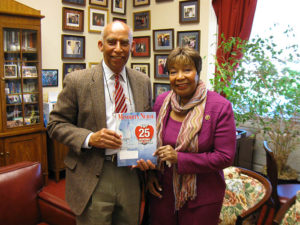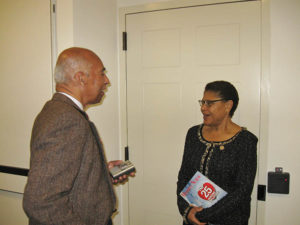Outside a dining room in the Longworth House Office Building on Capitol Hill, I asked Congresswoman Karen Bass of California how nursing prepared her for service in Congress. Her response was quick: “Good bedside manner.” But she has had only three terms to hone those skills to propose, advocate, or deliver legislation that impacts the field of her choosing. Not so for Congresswoman Eddie Bernice Johnson of Texas. She is an accomplished nurse, administrator, and legislator covering 23 years in Congress and 60 years as a nurse. I recently visited with them both and gained a fresh perspective on their experiences as nurses in Congress, as well as a candid reflection on the issues currently afflicting our country.
Congresswoman Johnson set her mind on becoming a nurse as a teenager, but in 1952 no nursing program in Texas would accept her, so she applied and was admitted to St. Mary’s College in Notre Dame, Indiana, graduating in 1955. She holds the BS degree in nursing from Texas Christian University, and in 1976, she was awarded the MPA degree from Southern Methodist University. Ten years into her nursing career at Veterans Affairs (VA), she was appointed chief psychiatric nurse at the VA Hospital in Dallas. In 1977, she was appointed regional director of the U.S. Department of Health, Education, and Welfare.
Before her election to Congress, Johnson served as a member of the Texas State House of Representatives from 1972-1977 and a member of the Texas State Senate from 1986-1992. She was elected as a Democrat in 1992 to the 103rd Congress and is in her 12th term representing the 30th Congressional District. In December 2010, she was elected as the first African American and first female ranking member of the House Committee on Science, Space, and Technology, a standing committee of the U.S. House of Representatives. Additionally, she was the first African American female to serve as chairwoman of the Subcommittee on Water Resources and Environment during the 110th and 111th sessions of Congress. Her name is attached to several pieces of legislation. Her office in the Rayburn House Office Building impresses visitors who can clearly see what seniority provides.
James Daniels: Mrs. Johnson, your accomplishments are impressive and even astonishing. Your firsts set you apart as a genuine trailblazer. You are the first woman ever elected to represent Dallas in the U.S. Congress. You are the very first chief psychiatric nurse of Dallas; first African American elected to the Texas House of Representatives from Dallas; first woman in Texas history to lead a major committee of the Texas House of Representatives; first African American appointed regional director of U.S. Department of Health, Education, and Welfare; and the first female African American elected from the Dallas area as a Texas senator since Reconstruction. Your crowning accomplishment, however, is as the first nurse elected to the United States House of Representatives.
Congresswoman Johnson: And I hope I won’t be the last!
Daniels: You are clearly regarded as a pioneer because of all the firsts you have accomplished. What does this mean to you? How do you handle that?
Johnson: I never think about it until someone brings it up. I don’t see it as extraordinary. I see it as opportunities that appeared, and I took advantage of them and was fortunate enough to get elected. It has not been easy because I was the first. As a matter of fact, it has probably been more difficult because of that.
Daniels: What motivated you to enter politics coming from a stellar career in nursing?
Johnson: When I was first approached about running for office, I thought it was a joke. All of the women I spent most of my volunteer time working with were mostly white at that time. The judge that gave Lyndon Johnson the oath of office, Sarah T. Hughes, was the one who pushed it, and along with others, encouraged me. It was the white community that persuaded Stanley Marcus [Chairman of Neiman Marcus] to give me a job because I was working for the government at that time. My African American community had to be brought along because they thought what I was doing was a man’s job.
Daniels: So, you were a pioneer.
Johnson: I guess so! My campaign was run out of my garage and my dining room. Not until I went into a run-off against my opponent did my African American women bring their support. After I won, everyone became my friend.
Daniels: You could not get into any university in Texas to obtain your nursing degree.
Johnson: There was no nursing degree program in Texas [in 1952] with national recognition that I could attend. This was before the University of Texas opened [its doors to black students]. It was before Baylor or Texas Christian opened, so that’s why I went out of state. The colleges [in Texas] were not integrated at that time.
Daniels: Growing up, did your parents influence you to achieve? What role did your parents play?
Johnson: My parents played a very key role, because education was number one for them. They thought it was very important. My grandmother was a teacher and went to Prairie View College. My father finished high school but did not want to go to college. He wanted to be a businessman. I watched them as examples.
Daniels: You’ve been here since 1993. What do you isolate as high points during your tenure?
Johnson: My high point was my first two years. Bill Clinton was president and we [Democrats] had a majority, and I had a chance to work very closely with the president in an environment where we were in the majority and with others who thought just the way we did. It lasted two years. This is my 23rd year and I’ve been in the majority six of those years. What I’ve learned during that time is to keep focused on my work and set the goals of what I was trying to achieve and just keep my attention on that. I have been able to get monies for research, and monies for transportation projects of all kinds. I always saw this as an opportunity to make things better at home. When I look back over my achievements, it feels pretty good.
Daniels: There are six members of the House of Representatives who are nurses. Do you ever find common ground on any legislative issue?
Johnson: Well, some. Four of us are Democrats. Unless I look on the roster, it is hard to tell who are nurses from the Republican side, primarily because they are governed from the top. Many things that we try to do—if they do not get permission to do it they will disappear on you.
Daniels: Some of your nursing background includes time with the VA. What do you think of the state of affairs in the VA?
Johnson: Most of my nursing career was at the VA. It needs great improvement. I didn’t blame the secretary [of VA]. It is that layer of management right under the secretary who has gotten their buddies in these hospitals, and it is fueled by retaliation if anyone complains. Until that is broken we will never get to solve the problems of the VA. People are so afraid if they report something because there is going to be retaliation. It’s a very bad situation.
Daniels: Do you think the president is on top of it?
Johnson: The president is trying. We appropriate enough money for every veteran to get first-class care. Care is not being given to the veterans as this point.
Daniels: Do you think Hillary Clinton is going to be the Democratic Party’s standard bearer?
Johnson: I don’t know, but if Hillary runs I will support her and will give it all I’ve got to see that she becomes president. I’ve known Hillary before she married Bill Clinton, so I know her very well.
Daniels: What’s the whisper regarding who is the likely Republican candidate?
Johnson: I have not seen too many Republican candidates that I liked—and I never thought I’d say this—the one that I liked, compared to the rest of them, was [George W. Bush] I never ever thought I’d say this. He was fun to work with, easy to talk with, he was accessible. He was more accessible than Obama is. Listen, when he called me and told me he would run for governor [of Texas], I said, “You what?” I asked him, “What made you decide to run for office?” He loved to have fun. He loved people. He still loves people. When he was in office he was a people person. I remember I called him to tell him I needed his support on the Water Resources Development bill I sponsored [in 2007]. I told him it’s to make sure there is no flooding of the Trinity River. I said, “Are you going to move back to Dallas when you leave the White House?” He said, “If I can find a house I can afford.” I said, “I just need your address because I want a trench from the Trinity to your front door so you’ll be the first to know when it floods.” But that’s the kind of relationship we had. We have the same relationship now.
About this time in our conversation, Johnson’s director of communications, Yinka Robinson, signaled that Johnson had another engagement. I thanked her for her time and invited her to take some photos with me. As she did, she leaned towards me and said, “I wish I had time to tell you what it was like to be the only black student at St. Mary’s. Perhaps we could do that at some later time.”
Congresswoman Karen Bass grew up with three brothers in the Venice/Fairfax area of Los Angeles and is the only daughter of DeWitt and Wilhelmina Bass. In 1990, she graduated from California State University, Dominguez Hills, with a BS in health sciences and certification as a licensed vocational nurse. She completed the University of Southern California’s Keck School of Medicine Physician Assistant Program, and for nearly a decade, worked as a physician assistant (PA). She also served as a clinical instructor.
Prior to serving in Congress, Bass made history when the California Assembly elected her to be its 67th Speaker, the first African American woman in U.S. history to serve in this powerful state legislative role. Bass serves on the House Committee on Foreign Affairs where she is the ranking member of the Subcommittee on Africa, Global Health, Global Human Rights, and International Organizations. As a member of the House Judiciary Committee, she is also working to craft sound criminal justice reforms as well as protect intellectual property right infringements that threaten the economic health of the 37th Congressional District she represents.
Bass’s office is in the Cannon House Office Building, but she is on her way to a luncheon with the Congressional Black Caucus and pauses to chat with me.
Daniels: You are the first PA ever elected to the Congress, and the first African American and woman elected as Speaker of any legislature in the United States. Does that give you a sense of pioneering?
Congresswoman Bass: No, it gives me a sense of enormous responsibility. I am happy to step up to that responsibility, but it definitely is a big responsibility.
Daniels: You leaped past nursing to obtain credentials as a PA. Why did you do that, and what drew you to the role of the PA?
Bass: When I was a nurse, the pathway to be a nurse practitioner was very, very long. I was a licensed vocational nurse. The pathway to be a PA was much more direct. And in those years I had originally started out to be a PA. But the PA profession was very new, [so] you had to be another profession first.
Daniels: Looking at your nursing and PA careers, how do they inform you to be an effective legislator?
Bass: Well, you know bedside manner can apply in a lot of different places. [Uproarious laughter.] And bedside manner in the political context is called diplomacy. As a PA, I worked in the emergency room, and when I was a nurse, I worked in acute care—both life and death areas—and that type of responsibility and pressure make this pressure seem a lot easier. It gives me a level of calmness in the midst of crisis that other people might not share.
Daniels: Now there are six nurses in Congress. Do you ever collaborate or find common ground with those on the other side of the isle?
Bass: Yes, as a matter of fact, Diane Black [Tennessee Republican Representative] and I are working on child welfare issues. We are both co-chairs of the Child Welfare Caucus. We know each other! It might not be nursing issues per se that we are working on, but it certainly is human service issues.
Daniels: I like what you just said about equipping you with good bedside manner. Does that say you use a lot of touchy, feely ways to persuade support for legislation you are advocating?
Bass: Absolutely.
Daniels: Tell us about your work on behalf of the foster care issue in the country.
Bass: It’s one of those issues that bring Republicans and Democrats together. The basic premise is that for kids who do not have families, who don’t have parents, it becomes the responsibility of government to take care of those kids. And we should take care of those kids as we would take care of our own. Those are the values that underlie the work that I do on child welfare.
Daniels: Do you run up against Republicans who believe this is just another government overreach?
Bass: No, no, I don’t at all. Diane Black is a Republican and she is the co-chair of the committee. This is an area where members of Congress come together because most of the members of Congress are parents. When it comes to juvenile dependency, kids who are without parents, people are a lot more open.
Daniels: About your work on behalf of Africa, do you see a movement towards democracy and the establishment of democratic institutions?
Bass: Absolutely. The big issue in Africa right now from the perspective of minority nurses is the reason why the Ebola crisis happened. The health infrastructure in those particular countries was so weak that it got out of control. In countries like Nigeria, where they had a few cases, they were able to bring it under control. I think one of the biggest issues for the continent of Africa right now is making sure its health infrastructure is strong enough so that when an epidemic happens it is not catastrophic.
Daniels: And your hot button issue that you are pursuing in this Congress?
Bass: My hot button issue regarding Africa is trade. There is a trade agreement that we need to have happen, the African Growth and Opportunity Act. In terms of health care, it is to ensure that our health care reforms stay strong.
- How do Patient Navigators Contribute to Equitable, Quality and Culturally Appropriate Health Care? - June 22, 2022
- The School Nurse—Fully Engaged in Community Health - April 17, 2020
- Are We “Poaching” Jamaican Nurses? - August 3, 2017





